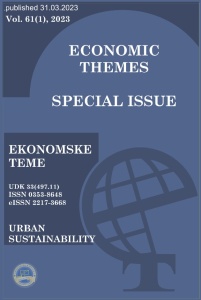Economic Themes (2023) 61 (1) 2, 19-39
Ian Shuttleworth, Claire Feehan
Abstract: Policy interventions to encourage the use of healthy and sustainable modes of travel to work (such as walking and cycling) have encountered varying levels of success. In areas such as Northern Ireland, and cities such as Belfast, the car remains the dominant mode for journeys to and from work. This paper explores why this is the case by examining the individual, household, and geographical factors that govern (a) changing between one census and another to walking or cycling from other transport modes; (b) changing from walking or cycling; and continuing to walk or cycle. The analysis is undertaken using the Northern Ireland Longitudinal Study (NILS), a 28% random sample of the population. The results show that walking or cycling is associated with lower-status jobs, urban locations, with no clear association with better self-reported health. In contrast, car commuting is associated with better education, health, and higher labour market status. The analysis shows that policies to encourage the use of more sustainable and less polluting transport face formidable barriers from status perceptions, time budgets, and the geographical contexts of Northern Ireland and Belfast.
Keywords: policy interventions; sustainable modes of travel; walking and cycling; car commuting; Northern Ireland Longitudinal Study (NILS)
ACTIVE TRANSPORT AND THE JOURNEY TO WORK IN NORTHERN IRELAND: A LONGITUDINAL PERSPECTIVE 1991-2011
Ian Shuttleworth, Claire Feehan
Abstract: Policy interventions to encourage the use of healthy and sustainable modes of travel to work (such as walking and cycling) have encountered varying levels of success. In areas such as Northern Ireland, and cities such as Belfast, the car remains the dominant mode for journeys to and from work. This paper explores why this is the case by examining the individual, household, and geographical factors that govern (a) changing between one census and another to walking or cycling from other transport modes; (b) changing from walking or cycling; and continuing to walk or cycle. The analysis is undertaken using the Northern Ireland Longitudinal Study (NILS), a 28% random sample of the population. The results show that walking or cycling is associated with lower-status jobs, urban locations, with no clear association with better self-reported health. In contrast, car commuting is associated with better education, health, and higher labour market status. The analysis shows that policies to encourage the use of more sustainable and less polluting transport face formidable barriers from status perceptions, time budgets, and the geographical contexts of Northern Ireland and Belfast.
Keywords: policy interventions; sustainable modes of travel; walking and cycling; car commuting; Northern Ireland Longitudinal Study (NILS)

